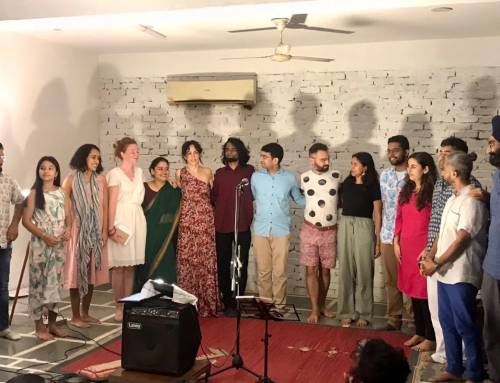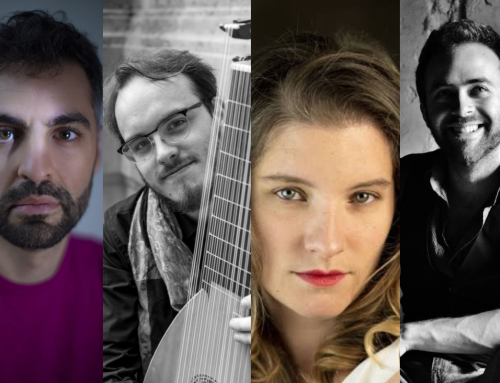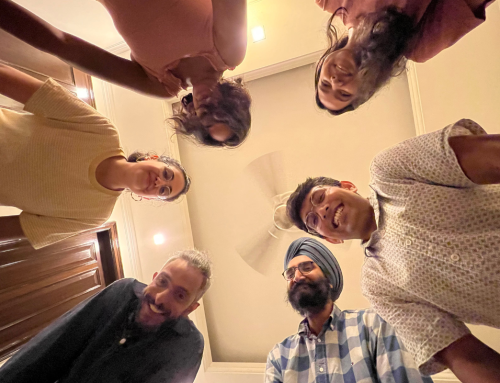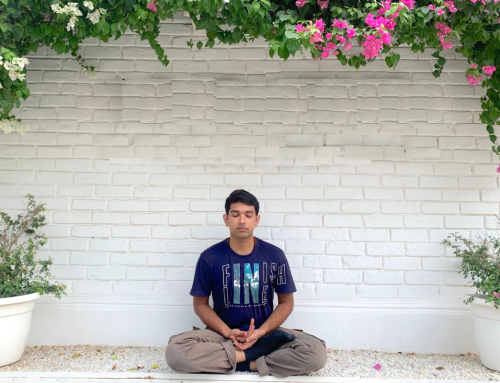Designed and curated by Subhadra Kamath, Taashi Sharma
Edited by Bhanu Sharma
Across various cultures and times, music has been a source of solace and healing for many. Whether as a piece of art that is received or as a piece of work created, the processes of engaging with music are multidimensionally enriching and invigorating. Music is known to aid the body and mind in wellbeing and everyone, from infants to octogenarians have felt the power of music being a space for connection, for upliftment and growth.
In this edition of The Journal, we explore the healing space that music creates, both as a tool for therapy as well as for being a therapeutic space.
In a tete-a-tete with Céline Burlot, who is a teacher and music therapist at Lilanoor, we delve into the nitty gritties of Music Therapy.
What is music therapy? What drew you towards it?
Music therapy is a form of therapy, where music is the tool for therapy. Music is the medium that we use between the patient and the therapist, with a therapeutic goal. In Europe, we usually separate music therapy into 2 categories: receptive music therapy, and active music therapy. The first is about listening to music, and seeing what it brings up (sensations, memories, emotions). The music takes us into our past (recent or distant), our subconscious is mobilised and music is used to help verbalise things that come up. The second one is active music therapy, where we use music to anchor the patient into the present, and help them to create their own music, their own way of communicating. They are encouraged to play instruments, often percussion, (often considered a more basic human musical instinct) or to sing, to express themselves.
Both methods can be combined too, depending on the needs of the person, on their pathology, abilities, sensitivities. To simplify, we could say we use receptive music therapy mainly for people who can and need to put words to their psychological pain, and active music therapy for people who need to express themselves through the body as a priority. Sound healing is also another aspect of music therapy.
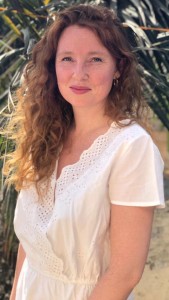 I started playing music when I was 5 or 6. It has always been a way of expressing myself, I would play my flute to say what I was feeling. I was listening to music and imagining stories constantly. It helped me deal with some difficult situations, and it’s actually much later that I realised that it had always been like therapy for me. Even though music was very important for me, I decided to study business to follow a more “conventional” path. But at the age of 30, after having worked for 10 years in the business field, I had to stop and recognise that it was not fulfilling at all. This is when I realised that I had to put music back in the centre of my life, and not only as a musician, but as someone who could help people using music as an aid, as it had always been for me.
I started playing music when I was 5 or 6. It has always been a way of expressing myself, I would play my flute to say what I was feeling. I was listening to music and imagining stories constantly. It helped me deal with some difficult situations, and it’s actually much later that I realised that it had always been like therapy for me. Even though music was very important for me, I decided to study business to follow a more “conventional” path. But at the age of 30, after having worked for 10 years in the business field, I had to stop and recognise that it was not fulfilling at all. This is when I realised that I had to put music back in the centre of my life, and not only as a musician, but as someone who could help people using music as an aid, as it had always been for me.
What modalities do you use in your sessions? And what kind of people do you usually work with?
I use both receptive and active music therapy techniques. The first to help the person connect with their sensations, with their emotions, with themselves basically. Then active music therapy mainly through dance, to help the person to express and release what they have been experiencing in the first part of the session. I work mainly with adults who are in need of a space to pause for a moment, look within and see how they really feel, and how they could find more peace in their lives by accepting their vulnerability.
What does your Music Therapy toolkit look like?
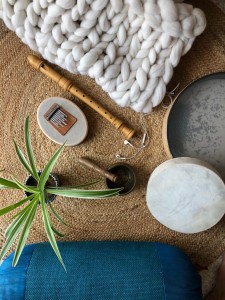 I always have a speaker and a playlist with lots of songs. “Working songs” as I call them, are the songs that I use to help the person to connect to their emotions. Whatever the music brings up for the patient, as sensations, images, memories become cues for me to to quickly adapt to during the session, and to choose songs that will connect to the person or the group in the moment.
I always have a speaker and a playlist with lots of songs. “Working songs” as I call them, are the songs that I use to help the person to connect to their emotions. Whatever the music brings up for the patient, as sensations, images, memories become cues for me to to quickly adapt to during the session, and to choose songs that will connect to the person or the group in the moment.
I also have some instruments, some percussion instruments and other kinds of simple instruments like the ocean drum, rainstick, glockenspiels, chimes, shakers, the kalimba that can be played by the person to express what they are feeling. I also play some gentle percussion at the end of the session along with my voice to help the person to enter in a state of relaxation.
Can you share a memory from one of your sessions (either the ones you take or have received) that illustrated the power of music for you?
In many sessions, when the person connects to their emotions, and when catharsis happens are very special moments for me. I feel like things are taking their right place. These moments are very important, this is why I am doing these sessions, to give this space to everyone to let their emotions be, whatever way they come out, crying, screaming… It can happen with the first notes of a piece of music, or with a few notes in the middle of the song. We don’t really know what is happening, how it is happening, but it seems that the music is opening a lock somewhere, taking the person back to a memory, be it precise or not, or just a sensation, an emotion.
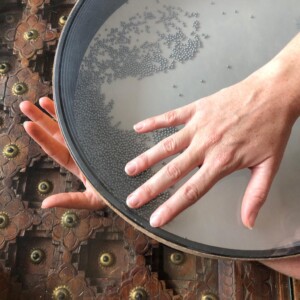 Many times I feel the power of music. There are all the situations where suddenly music touches me, bringing a memory back, and the emotions associated, or just an emotion that will give me some clues on how I am dealing with a situation. I really have this feeling that music is entering me, unlocking something for my well being.
Many times I feel the power of music. There are all the situations where suddenly music touches me, bringing a memory back, and the emotions associated, or just an emotion that will give me some clues on how I am dealing with a situation. I really have this feeling that music is entering me, unlocking something for my well being.
One really special memory would be an experience I had during my training. All the students had to come with their most hated song. We had to make everyone listen to it, and then explain why we hate it. We were all pretty unsure of the point of this exercise, and at the end, we were all stunned by what came out. What happened is that for many of us, we had been preparing the explanation of why we hated it, a very well-thought out explanation. But when we had to explain it in front of everybody, the real reason why we hated it came out, and it was mostly related to an intimate and painful part of each one’s personal story. The exercise actually gave us the opportunity to understand some of our unresolved patterns and issues, just by using music as a mirror to look inside.
Who are some of the people who have influenced you on this journey?
Many people! My flute teacher, with whom I studied during my first 10 years of practice. She introduced me to the fact that music, emotions and bodies were absolutely connected. Some therapists I have been working with to move forward in my life at some points, lots of the music therapists by whom I have been trained inspired me a lot too. All of them were encouraging me to listen to myself, to know myself better.
Their belief, and this is my belief too, is that when you yourself are conscious of your traumas and triggers and you work turning them into strengths, is when you can also help people to do this work on themselves. You can’t do the work for them, but you can support and direct them because you have been, or are, going through the process yourself. It is about accepting your own vulnerability first, being true to yourself to help other people on their own journey.
Apart from formal sessions, how can one tap into the healing power of music?
What I am offering in the sessions is actually a tool that anyone can use whenever they have the space for it. I think that it is about learning how to be conscious of what the music is creating within when we stop a moment to listen to it carefully. It is about listening to music in a slightly different way, not just with the ears but with your gut.
What is your dream for your work through Music Therapy?
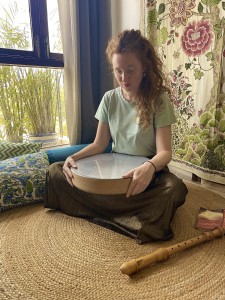 Music as a therapy is actually something very old. Some tribes were and are still using it since many many years, without using the term music therapy. In our modern world, we are slowly losing the power of these traditions, especially in the western countries. My dream would just be that we can use music again, more genuinely before we need it as proper therapy. To tune into music and to connect because it is so easy and so powerful.
Music as a therapy is actually something very old. Some tribes were and are still using it since many many years, without using the term music therapy. In our modern world, we are slowly losing the power of these traditions, especially in the western countries. My dream would just be that we can use music again, more genuinely before we need it as proper therapy. To tune into music and to connect because it is so easy and so powerful.
Music and Dementia
Music accesses different parts of the brain than language, so music can be used to communicate or engage with someone who has been diagnosed with dementia, even if they no longer speak or respond to other people’s words.
Playing soothing music to a person may inspire an emotional reaction in them. Playing music that meant something to them, such as a favourite song, a piece of music from their wedding, or a tune they used to sing to their children, can tap into powerful memories and emotions.
Former Ballet Dancer with Alzheimers reacts to Swan Lake Music
Your Brain on Music
In this next section, we look at the role music has played in some of our teachers’ and faculty’s lives as a tool for healing in a non clinical setting. The power of music transcends all boundaries of space and time and sometimes, it’s important to remember its place in our existence as professionals performing, creating and teaching music.
How does music contribute to your emotional health?
SHERRY: Personally, music is an integral part of my emotional health and stability. It helps me understand what I am feeling and a lot of times helps me be present(in the moment?) Music also helps me focus and prepare my state of mind to be able to navigate most eventualities.
BHANU: Music for me is an important channel that connects me with the material world. It is something that allows me to process my experiences and give them a form, which becomes an important indicator and guide, whether it’s listening to someone else’s music or creating my own.
TAASHI: Music helps me to get in touch with my emotions. If I’m feeling sad, music helps me to feel that sadness. I find it important to understand your emotions, negative or positive, and music allows me to feel those emotions deeply and understand myself better.
SUBHADRA: I think music and sound are an important part of my being and my identity, as well as my connection with the world around me. For me, the thought of not having music to listen to is really scary because it’s such an important part of my days. Whether I am happy, sad, confused or blank, music always helps me connect with myself and things around me.
AKASH: Sound is one of the purest forms of Reception and Expression that exists in the universe for me. Me as a person I have a very sound oriented mind as well. The thoughts in my mind predominantly occur in the form of sounds, I basically speak to myself, as opposed to having pictorial thoughts. This is to say that I have a deep connection with sound in general. In turn, music has always moved me to do things and feel things in a certain way. The way the notes or rhythm patterns move in a song or a piece of music to a large extent determine what part of my memory or desire in is invoked. Music lets me indulge myself into emotional releases or explorations that usually I wouldn’t scratch on my own. it’s Therapeutic the least to say. what I cannot say in words, music gives me the power to express it differently. Keeps me balanced emotionally and mentally.
How does music – creating, listening, performing – make you feel?
SHERRY: Creating music, especially with a band or group of people, is a place where I can ideate and create something new along with others. Apart from my influences, seeing how the influences of others affect the way we interpret and write the music after these worlds meet is one of the main reasons I gravitate towards writing. It’s a tool for exploring what you’ve learnt and then sharing it with other people who are on their own paths, and when you write music together all these experiences come together.
Listening to music helps me be calm and almost be in a different world than what’s around me. It helps me focus and be mindful.
Performing music for me is extremely exhilarating as well as important. It’s where you can interpret music as you like. Where you can experiment, where you can be in the present, where you can bring in your own flavor while performing live. It makes each performance unique in its own way, however small or big the difference is. It serves as an outlet for the knowledge you’ve gained while studying music. Performing music is an integral part of my own growth in music and my being.
BHANU: It always feels different, sometimes intensely painful, sometimes utterly joyful, and at times kind of boring! The important thing is to feel everything and to push, carve, bend, jump, dance my way through the blocks and keep moving forward.
Sometimes it’s about connecting with people, sometimes with myself, and sometimes purely with the message behind the words and the music.
It is also something extremely physical. As a singer, feeling and channelising the breath towards sound is therapeutic, like an interior massage!
TAASHI: Listening to music has always been comforting to me. I feel calm, understood and less alone. It is also exciting for me to listen to diverse musical styles to see how I emotionally react to them, and observe different musicalities in various genres and cultures.
SUBHADRA: Singing has been a real gift for me, things that I can’t articulate otherwise escape my being through songs and melodies. When I sing freely and without pressure, I feel centred and liberated and stronger. There’s great value in just singing solo or engaging with music on your own but for me, when I engage with others through music, it’s fulfilling and helps me flow.
AKASH: It’s very interesting to think about this. Creating music makes me feel I’m in a position of control and in a state of being in control, both at the same time. It’s weird to explain this and sounds contradictory, but it’s 100% true for me. When I feel like expressing a thought or an emotion through sound, I have sound banks associated with those feelings and that’s kind of what comes out, and I have the choice to now move that sound whichever way I want to. to say exactly how I feel. At the same time, the notes themselves have a way of moving which guide me where to take them or they just won’t sound as beautiful. We usually call them cadences in music. but even before I knew this term, I just somehow knew that notes themselves have tendencies, kind of like a desire to move a certain way. There are a million ways to do it, and that’s where the creative part comes in. It’s a perfect blend of effort and effortlessness.
What is one of your most important memories associated with music?
SHERRY: The first time I sang in my school, at the age of 11. I was taking part in a solo voice competition and I had extreme stage fright. I was nervous of what was to come, but the moment the music started playing, I closed my eyes, shut everything around me and when I did start singing, it was just me and the music that was playing. That connection I had with music stayed with me. The ability to let go and be present is what music taught me early on.
BHANU: There are so many, but I think the experience of being in the same room as the sound of a tanpura, experiencing its vibrations physically is a powerful one for me.
TAASHI: It may not be one definite memory, but listening to music carries me back in time. Some music to me automatically takes me back to a certain place, situation, or an emotion I was feeling. Music is powerful in that it subconsciously reminds you of a time in the past, and everyone has their own unique memory/association through it. There are many other mediums of such reminders – photographs, scents, flavours, but for me personally, music is the strongest.
SUBHADRA: I remember once I was really not feeling physically well through the day and suddenly in the evening I sang with some friends and everything became ok, it worked like magic. Also when I did a session with Celine at the school, it was with all the other teachers and it was through very simple things that she brought us all together and gave us a safe space to be vulnerable around each other. That really changed my relationship with my colleagues, and with the space as well.
AKASH: This is the first memory that I have of myself, I was about 13 to 15 months old. (I know this because I had described to my mother the house we used to live in, and she told me that we used to live in that house when I was that little). I remember everything very clearly, how the weather that day was, how the kitchen was set up, where my mom used to keep the rice, we even had a 4 inch green water tube hanging from the tap in the kitchen sink. I remember the one single mattress cot in that house, my dad was lying down on it. wearing a plain black t-shirt, listening to – ‘Koi Sagar Dil Ko Behlata Nahi’ by Mohd. Rafi and singing along. I figured the name of the song much later when I grew older by matching the melody that was stuck to this memory.
Music Therapy Program Details
At Lilanoor Center for Voice and Music, we think that being a singer is also being in harmony with our body and mind. Therefore, music therapy methods can be used and adapted to each students, to help them to overcome the difficulties they could be facing and which could affect their vocal practice. This is why we also created a Music Therapy Program, to develop this discipline in India.
Available Formats: Offline (recommended), Online
Age Requirement: 18 years or above
| 4 Classes/Month | 2 Classes/Month | 1 Class/Month | |
|---|---|---|---|
| Individual | INR 7,000 | INR 4,000 | INR 2,500 |
Lilanoor Monthly Puzzle
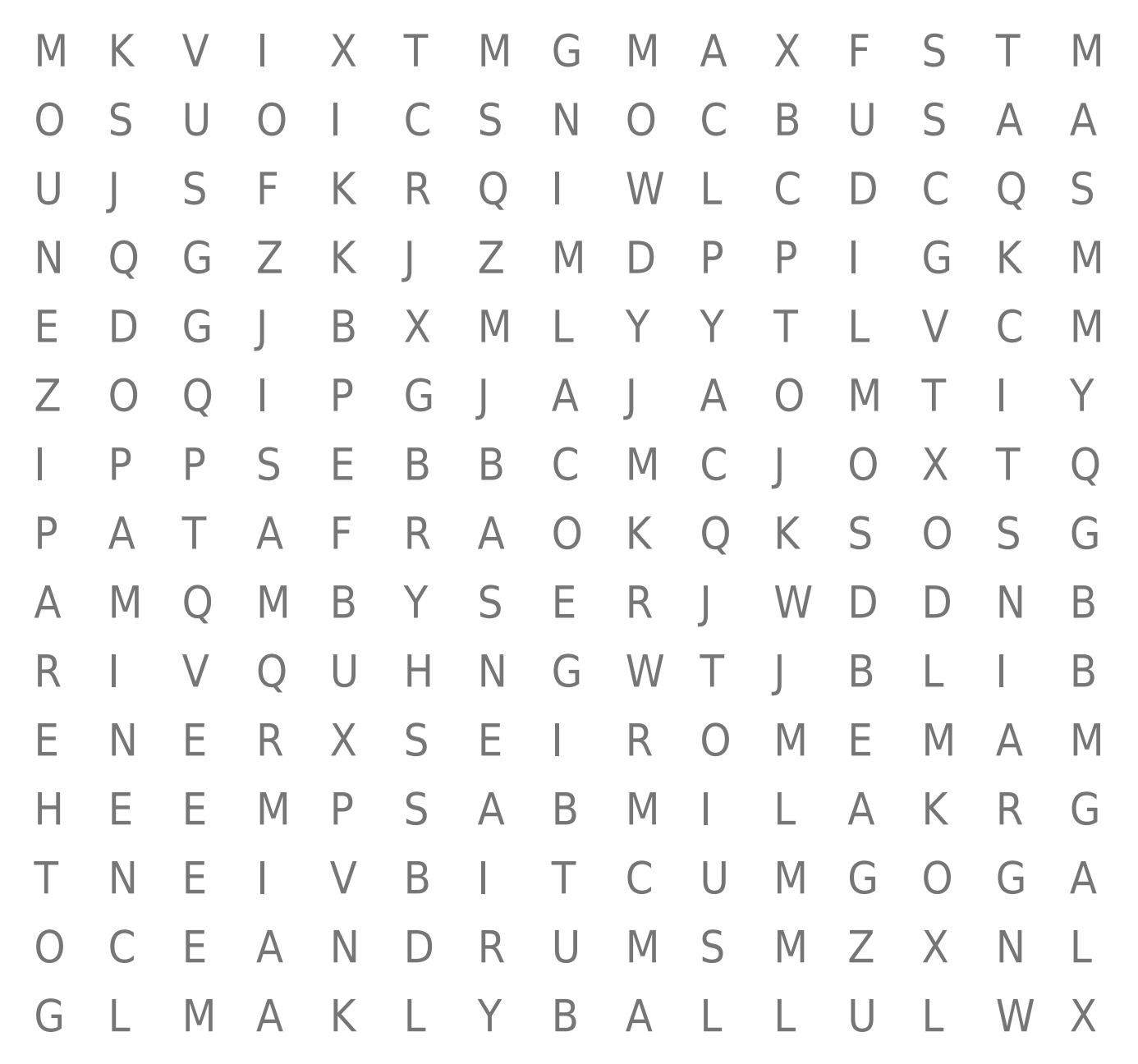
Created through dictionary.com
CALMING
KALIMBA
OCEANDRUM
SUBCONSCIOUS
DOPAMINE
LULLABY
RAINSTICK
THERAPIZE
GLOCKENSPIEL
MEMORIES
SOMATIC
Artist Recommendations
For this month, we asked our teachers to share some music that moves them, or helps them heal:
BHANU: It completely depends on the state of mind. The Police, U2, 50 Cent, Hindustani classical singers like Kishori Amonkar and Bade Ghulam Ali Khan, Bach, John Mayer, Rihanna are some artists you’ll often find on my playlist!
SUBHADRA: Zero 7, Regina Spektor, Hania Rani, Imogen Heap, Lizzy McAlpine, Tina Dico, Yebba, The Staves, Lianne La Havas – I think the way they emote so beautifully through their music and even words helps me understand my emotions as well.
Answer to Puzzle
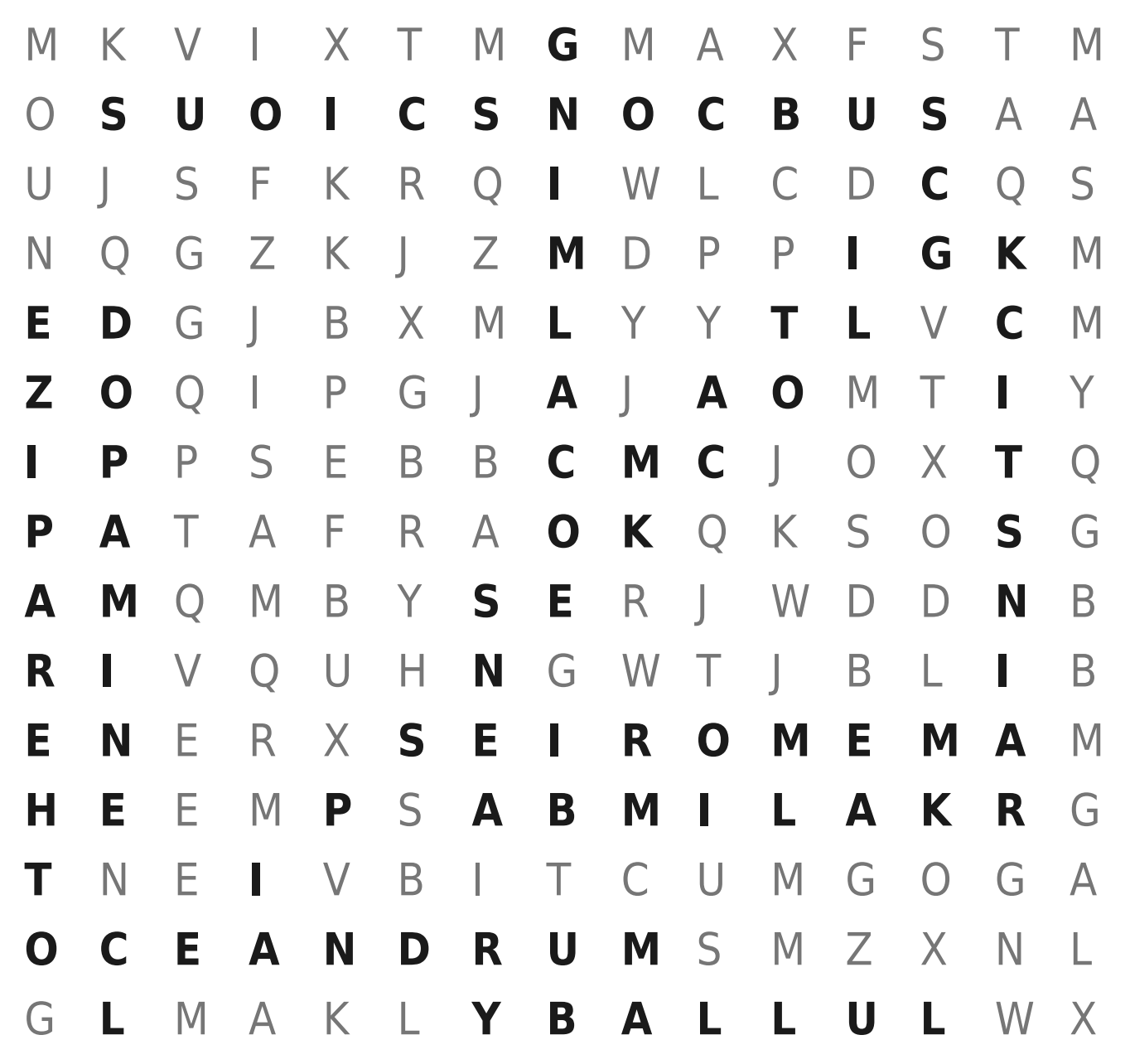
Created through dictionary.com
